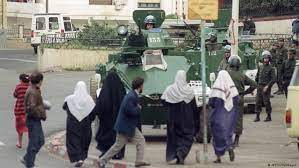Salamati Civil War: Difference between revisions
No edit summary |
No edit summary |
||
| Line 55: | Line 55: | ||
== Context == | == Context == | ||
[[Salamat]] was an authoritarian state led by [[Jalil Al Kharrabi]], which imposed himself to power on May 16 1977. In the late 80s however, his authority was weakening and the stability of the country dwindling ; the [[1987-1991 Salamati famine]], the lack of job and housing opportunities, the lack of political freedom, and international embargoes against the country weakened the country's economy (GDP decreased from 47.2 billion in 1985 to 40.7 billion in 1988) and the famine damaged infrastructures and prevented basic services (electricity, water supply, | [[Salamat]] was an authoritarian state led by [[Jalil Al Kharrabi]], which imposed himself to power on May 16 1977. In the late 80s however, his authority was weakening and the stability of the country dwindling ; the [[1987-1991 Salamati famine]], the lack of job and housing opportunities, the lack of political freedom, and international embargoes against the country weakened the country's economy (GDP decreased from 47.2 billion in 1985 to 40.7 billion in 1988) and the famine damaged infrastructures and prevented basic services (electricity, water supply, waste management) from functioning properly. At the same time, decreases in the oil barrel's price and cotton price per ton (respectively 25% and 34% of the country's budget in 1986) led the citizens to suffer from inflation, which would impact the country for over 15 years, and from external debts after massive loans granted from [[Riamo]] in February, May and October 1986. (The IMF would erase most of Salamat's debt in 1997). | ||
Consequently, Salamatis grew angrier about their government, marked by harshness and political inertia, as well as a provocative behaviour diplomatically which had a negative strain on the Salamatis image, especially those living abroad (eg. Salamati business lootings in Riamo from 1982-1988). Youth unemployment (15% in 1980, 36% in 1985, 60% in 1990) became a fuel for popular protests, which became weekly by the spring of 1990. Kharrabi opened up to the rest of the world the same year, but it wasn't sufficient, as the problems remained and the youth grew more and more radicalized to islamist groups proning "jihad" against the "infidel" government of Salamat and the killing of the "apostate" [[Jalil Al Kharrabi]], who defiled Islam before the rest of the world. | |||
The January reforms of Kharrabi were imposed too late and he was deposed 2 weeks after by the [[my]]which became the ruling political apparatus from now on. | |||
[[Category:Salamat]] | [[Category:Salamat]] | ||
Revision as of 23:24, 28 December 2023
The Salamati Civil War was a conflict opposing the Salamati government, islamist groups and Ankur independentists.
Context
Salamat was an authoritarian state led by Jalil Al Kharrabi, which imposed himself to power on May 16 1977. In the late 80s however, his authority was weakening and the stability of the country dwindling ; the 1987-1991 Salamati famine, the lack of job and housing opportunities, the lack of political freedom, and international embargoes against the country weakened the country's economy (GDP decreased from 47.2 billion in 1985 to 40.7 billion in 1988) and the famine damaged infrastructures and prevented basic services (electricity, water supply, waste management) from functioning properly. At the same time, decreases in the oil barrel's price and cotton price per ton (respectively 25% and 34% of the country's budget in 1986) led the citizens to suffer from inflation, which would impact the country for over 15 years, and from external debts after massive loans granted from Riamo in February, May and October 1986. (The IMF would erase most of Salamat's debt in 1997).
Consequently, Salamatis grew angrier about their government, marked by harshness and political inertia, as well as a provocative behaviour diplomatically which had a negative strain on the Salamatis image, especially those living abroad (eg. Salamati business lootings in Riamo from 1982-1988). Youth unemployment (15% in 1980, 36% in 1985, 60% in 1990) became a fuel for popular protests, which became weekly by the spring of 1990. Kharrabi opened up to the rest of the world the same year, but it wasn't sufficient, as the problems remained and the youth grew more and more radicalized to islamist groups proning "jihad" against the "infidel" government of Salamat and the killing of the "apostate" Jalil Al Kharrabi, who defiled Islam before the rest of the world.
The January reforms of Kharrabi were imposed too late and he was deposed 2 weeks after by the mywhich became the ruling political apparatus from now on.
